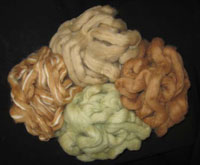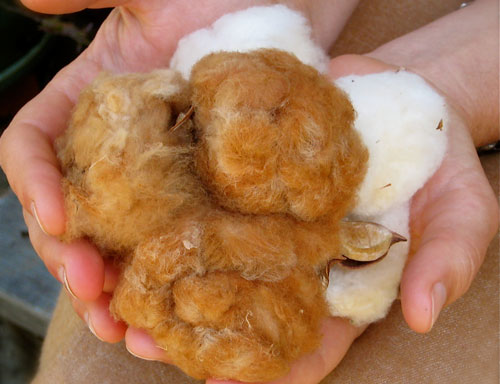"To exploit its dominance in cotton production, Turkey now plans to develop colored cotton. The country will produce two completely natural and colored cotton known asx‘sarı gelin’ (yellow bride) and ‘gelincik’ (poppy). The Ministry of Agriculture and Forestry plans to produce fabrics by using both natural and colored cotton as they do not need to be dyed."
 To exploit its dominance in cotton production, Turkey now plans to develop colored cotton. The country will produce two completely natural and colored cotton known asx‘sarı gelin’ (yellow bride) and ‘gelincik’ (poppy). The Ministry of Agriculture and Forestry plans to produce fabrics by using both natural and colored cotton as they do not need to be dyed.
To exploit its dominance in cotton production, Turkey now plans to develop colored cotton. The country will produce two completely natural and colored cotton known asx‘sarı gelin’ (yellow bride) and ‘gelincik’ (poppy). The Ministry of Agriculture and Forestry plans to produce fabrics by using both natural and colored cotton as they do not need to be dyed.
The ministry recently collaborated with a textile company for the mass production of the coloured cotton developed by the General Directorate of Agricultural Research and Policies (TAGEM). This company will produce in an area of 25,000 sq. mt. in 2019, and that after 2020 production with a more extensive contract will be established. As this cotton is natural, it does not have a carcinogenic effect, is environmentally harmless, organic and important for children’s clothing.
Saves water, energy, chemicals and time
The naturally colored cotton was produced in India, Pakistan, Egypt and Peru in B.C. 2700. The colors and shades of this cotton vary according to the climate and soil characteristics of the cultivation area. Its most common tone is yellowish brown. These cottons are either naturally derived from colored seeds or produced by breeding studies of universities and institutes.
shades of this cotton vary according to the climate and soil characteristics of the cultivation area. Its most common tone is yellowish brown. These cottons are either naturally derived from colored seeds or produced by breeding studies of universities and institutes.
Naturally colored cotton refers to brown and green cotton in different shades. As these cotton fibers do not need to be dyed, they eliminate the use of water, energy, chemicals and time spent for dyeing. They also prevent waste and pollution reducing the dyeing and finishing cost by almost half.
Market continues to grow
The fastness values of colored cotton are similar to those of the white cotton. The spinning of this cotton also demonstrate similar good values. Also, the color of this coloured cotton takes longer to fade after washing. It is therefore, considered as a value-add to the original white cotton.
The market for colored cotton market continues to grow with important researches being conducted on seeds and fibers across the world. Various universities and institutes have also introduced important studies in the field of colored cotton. For example, the Nazilli Cotton Research Institute produces colored cotton. Its patent for Nazilli DT15 type buff naturally colored cotton was obtained in 2005.
Another point working on colored cotton production in Turkey is Kahramanmaraş. After a long period of research, the production of colored cotton in this region began in the early 2000s with the Eastern Mediterranean Passage Agricultural Research Station Directorate and the Kahramanmaraş University Department of Agricultural Engineering with the production of three-different colors of cotton. Another institute that carries out studies on this subject is the Çukurova University Agricultural Engineering Department.
Total cotton production increased to 502,000 hectares in the 2017/18 season in Turkey. Cultivation of cotton, which was 2 million 100,000 ton in 2016/17 season, increased to 2 million 570,000 ton in 2017/18 season. For the 2018/19 season, it is estimated to be around 2 million 200,000 tonne over 525,000 hectare.












